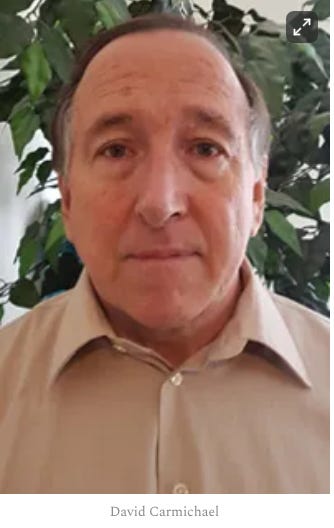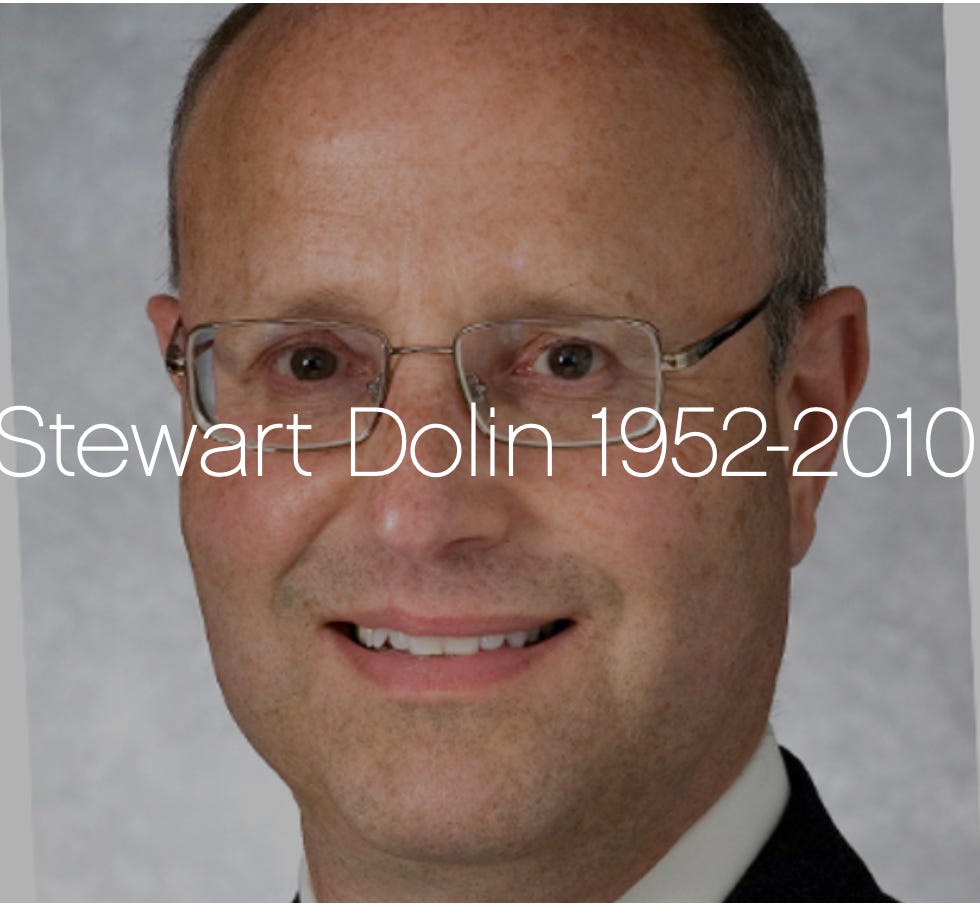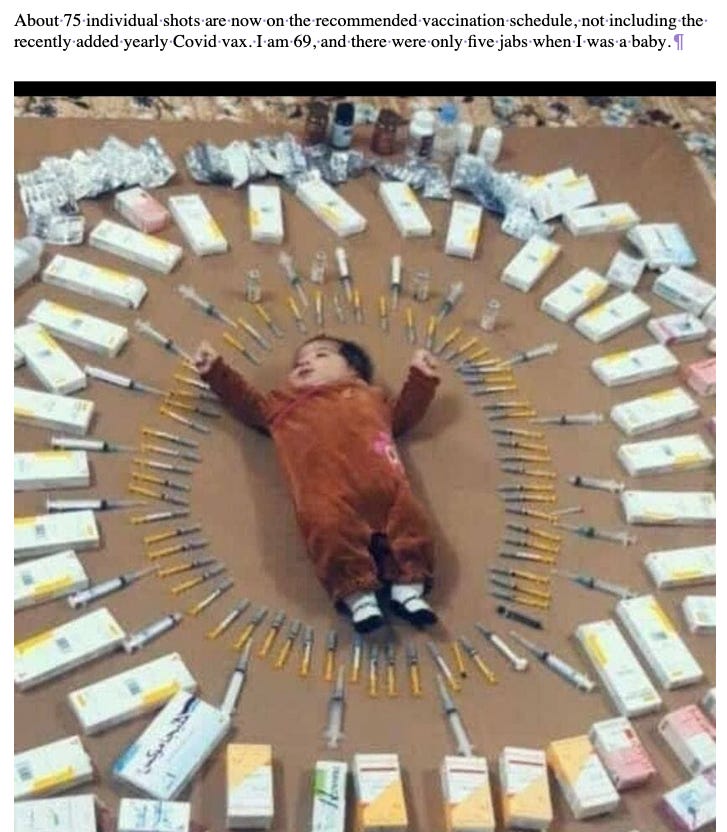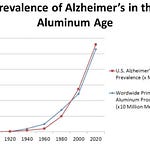Yoho resources: HERE are links to download my CV, ebooks, the best recent posts, and instructions on searching my archives. Also, HERE are links to purchase OSR, DMSO, and chlorine dioxide products, where to find them, and more. Please review Judas Dentistry; the direct link is HERE. I need your help because a passel of mercury-intoxicated dentists are giving me one-star reviews. Finally, if you have a good story or are an expert who wants to be interviewed, don't hesitate to contact me at RobertYohoAuthor@gmail.com. I am also available for podcasts anytime for my subscriber Substackers; email me by replying to a post. I will repost the session on my platform if we do well.
Counterpoint: Miles Mathis wrote, “The Healthcare CEO's Murder is Another Fake”
I hate to be the bearer of bad tidings, but that asshole is still alive somewhere, probably on some island beach. I knew it the moment I saw this story. How? You are about to find out.
The first clue is that police released footage immediately to the press, so I knew the police and press were in on the fake. If this were real they wouldn't be airing it to the public within hours. It would be considered a snuff film.
The second clue is that CEOs of big healthcare companies like this are not walking around by themselves on the streets of Manhattan at night, precisely for this reason. You will say this was in the morning, but we can see from the footage that it was still dark (about half an hour before sunrise). Tony Fauci and Albert Bourla are known to have heavy security, and we may assume the same for Brian Thompson.
The third clue is that the film looks fake. The guy playing Thompson is a bad actor, and his reactions are comical. Plus, notice what no one else has: the SUV hits its brake lights right there and leaves them on as the film starts. What does that mean? It means AAAANNNDD. . . ACTION!
The fourth clue is that it is convenient, isn't it, that this murder just happened to take place right beneath a street camera aimed directly at the scene, with our boys center of frame. Front and center, but from the back, so we can't identify Thompson. And the camera is moving, indicating it is handheld, not a street camera.
***
[The entire story’s] main function: keep your eyes off the real world and real events. They want you following this and other sexy fiction (like drones and school shootings), so that you forget to revolt for the vaccine genocide, the rape of the treasury, the destruction of the environment, the destruction of the heterosexual relationship, the destruction of the family, and a thousand other things. They have to lull you back to sleep with the promise that Trump will solve everything, while feeding you this Hollywood fake reality as a dreamscape.
(The post is here. There is a lot more)
The person who sent me this, Jim Arnold of Liar’s World Substack, has studied Mathis since 2015. He says Mathis has a vast following, has written over 100 books, and is seldom wrong. Jim agrees with him—all big news stories are fake or juiced, and the only thing we can learn from them is how twisted our Truman Show world has become.
To expose SSRIs, from here on I will assume Magione killed the CEO. I do not know the truth, but the evidence below supports this possibility.
Table of Contents for Evil SSRIs
My interview with David Carmichael is featured above. He was under the influence of the SSRI Paxil when he killed his dear son.
I describe in this post how Stewart Dolon threw himself in front of a train after his doctor prescribed Paxil.
Tim Alexander learned about SSRIs fast when his brother-in-law became the San Bernadino shooter.
My “Prozac and Relatives” chapter from Butchered by “Healthcare” is the most succinct and complete introduction to SSRIs.
1. David Carmichael did the unthinkable.
When he took Paxil for two periods of several months each, he felt suicidal each time. His doctor advised him that increasing his dose would decrease his stress. When he did, he went from suicidal to homicidal and carefully planned the murder of his 11-year-old son in a hotel room. He describes his actions and state of mind in the interview at the top.
The Canadian court acquitted him of murder because he was believed to be temporarily psychotic, which means he was out of touch with reality. Since blaming the drug was impractical for his legal defense, this was not brought forward at his trial.
2. Steward Dolin’s family doctor and friend prescribed generic Paxil for him.
His wife, Wendy, learned about antidepressants the hard way when Stewart threw himself in front of a train a week after he started taking it. Mr. Dolin’s doctor gave him the drug for job-related anxiety, but it creates intolerable restlessness in three to five percent of people using it. He was last seen pacing back and forth on the train platform.
He killed himself despite what his family thought was a perfect life. His two grown children adored him, and he loved his career, travel, skiing, and work. He was happily married to his high school sweetheart.
When Ms. Dolin sued the drug company, testimony established that it had hidden Paxil-related suicides. The manufacturer had quietly settled thousands of similar cases for two decades while making billions of dollars. In 2017, Ms. Dolin won a three-million-dollar judgment. Her attorneys had spent a million dollars, but the company filed an appeal. It claimed that the original manufacturer was not responsible for subsequent generic versions of the medication.
Wendy Dolin started MISSD, a charity that exposes these issues.
3. Tim Alexander’s story
Tim is a documentary filmmaker whose marriage ceremony to Karen was conducted by Pastor Cedric Anderson.
Tim Alexander is on the left, and Anderson is on the right during the wedding ceremony. Shortly after this, Pastor Anderson married Tim’s cousin, Karen Smith.
But Anderson became erratic, paranoid, and delusional. Karen Smith moved out after only 6 weeks because of his bizarre behavior. He was taking SSRI antidepressants, but not even his mother knew.
A month later, Cedric Anderson entered the elementary school where his wife taught. He shot and killed her, a student, and then himself. It was a nationwide media story for two months, and Anderson was dubbed the San Bernadino shooter. No mention of the medications he was taking was seen anywhere.
Tim kept asking himself how such an impossible event could have happened to people he knew and loved. Tim formed a Facebook group called “Legal Death - In Drugs We Trust” that addressed catastrophic drug effects. It grew to 30,000 people within a few months. He learned that suicide and violent behavior were well-established side effects of SSRI antidepressants. He went on a months-long road trip to interview people whose lives had been ruined by legal drugs for his film.
Tim also found that mass shooters are universally taking SSRIs and that the media covers it up. A list of the shooters and their drugs is HERE.
4. “Prozac and Relatives” chapter from Butchered by “Healthcare”
The medical profession is being bought by the pharmaceutical industry, not only in terms of the practice of medicine, but also in terms of teaching and research. The academic institutions of this country are allowing themselves to be the paid agents of the pharmaceutical industry.
Arnold Relman, MD, former editor NEJM (2002)
I wrote about a thousand Prozac-type SSRI prescriptions over my career, which might have been a half-million dollars in drug sales. I screened my patients, as I was trained, by merely asking them a few questions.
Peter Kramer's bestselling Listening to Prozac (1997) duped me. He said Prozac could save patients from common symptoms of guilt, fatigue, sadness, sleep disturbance, and even aches or digestive problems. He also claimed it could be a lifestyle drug similar to today's Viagra, boosting ordinary peoples’ performance. I learned later that the SSRIs are toxic, have limited utility, and the hype has produced vast overuse.
Industry marketed SSRIs as an improvement on the older tricyclic antidepressants. These cause sedation, and only a month’s supply is needed for suicide. Part of the promotion of the Prozac-class drugs was that sleepiness is mild, and even enormous doses rarely cause fatality.
Before the drug era, doctors thought depression was rare and most often self-limited to about three months. Now (2020), Wikipedia claims that 17 percent of the US population becomes depressed during their lifetime, making them all candidates for expensive, indefinite medication usage. Legions of paid Wiki contributors, many of whom work for pharmaceutical companies, make this source only a little better than a drug industry link farm.
A simple checklist is used to diagnose depression. A primary care medical assistant often administrates it. It is a list of nonspecific symptoms from the DSM. Many are opposites.
DSM criteria for depression:
✪ Depressed mood most of the time
✪ Lack of pleasure most of the time
✪ Significant weight loss or gain, appetite up or down
✪ Slow or speeded-up thoughts and movements
✪ Feeling worthless or guilty most of the time
✪ Either fatigue or excess energy
✪ Cannot think or concentrate most of the time
✪ Thinking of death or suicide with or without a plan
No physical tests exist to verify the diagnosis. After waiting two weeks, doctors might commit a patient to these drugs for years—or even a lifetime. The industry promotes the disease, the medications, and the casual approach to treatment together.
“Prozac is not addictive,” according to the package label written by the manufacturer. True, there are no opioid-type withdrawals. However, after discontinuation, severe anxiety and depression are common. Other issues include suicide, feeling “electric shocks,” and tardive dyskinesia (TD), which is often manifest by continuous mouth movements. The drug companies claim most of this is because of the depressed state itself rather than medication effects. There were many consumer complaints to the Federal Trade Commission about these claims that antidepressants were not addictive.
When my patients sometimes stopped the SSRI drugs and had symptoms of depression and anxiety, I believed, as I was trained, that it was their disease and not the drug withdrawal. I was told that they must use the medications long-term for them to work, so I told everyone to continue. It was bogus information, however.
The Selective Serotonin Re-uptake Inhibitor (SSRI) name was pseudoscience dreamed up in the marketing department of SmithKline Beecham. The “chemical imbalance in the brain” idea was the brainstorm of a sales copywriter in the 1950s. Knowledge of serotonin and other neurotransmitters was even more sketchy when Prozac was invented than it is now. Today, this seductive but mythical gibberish embarrasses researchers.
Similarly, “ACE inhibitor” or “angiotensin-converting enzyme” blood pressure medications were gobbledegook names for branding. Lithium is an old therapy for bipolar illness with no sparkling, pseudo-scientific story associated with it. It is not patented or a money-maker, so no one will pay a copywriter to invent a marketing idea. Note: lithium causes sedation and occasional tardive dyskinesia. It becomes toxic in doses only slightly higher than the therapeutic ones. This can cause permanent brain damage.
The marketers said depression was like diabetes, and SSRIs were an “insulin” for brain disease. However, no clear relationship of depression to serotonin or other neurotransmitters was ever established, and the drugs all work about the same, with a similar lack of benefit. Jill Moncrieff in The Bitterest Pills (2013) confirmed this:
No chemical imbalance or other biological process that might explain drug action in a disease-centered way has been substantiated for any psychiatric disorder ... Most authorities now admit that there is no evidence that depression is associated with abnormalities of serotonin or noradrenaline, as used to be believed (Dubovsky et al., 2001). There is also little empirical support for the dopamine hypothesis of schizophrenia.
Ronald Pies, editor-in-chief emeritus of the Psychiatric Times, agreed: “The ‘chemical imbalance’ notion was always a kind of urban legend—never a theory seriously propounded by well-informed psychiatrists… [it was a] myth.”
Despite this consensus, nearly everyone still believes the metaphor and parrots the message. The idea is 1) your brain is damaged, 2) the drugs fix something, and 3) you need to take medications indefinitely.
SSRIs cause substantial harm. A 2017 literature review of randomized controlled trials in Frontiers in Psychiatry said these drugs are ineffective and damaging. It linked them to osteoporosis and movement disorders, including akathisia and tardive dyskinesia. They may double the risks of miscarriage and congenital disabilities. However, physicians use them off-label for pregnant women and during breastfeeding. Expectant mothers get severe withdrawal symptoms just like anyone else.
Sexual side effects occur in a range from 2% to 59% in various trials. In some studies, they never asked the patients about the issue. When used for premature ejaculation, about a third of men permanently improved, sometimes after just a few pills or even a single dose. This suggests significant long-term effects that are adverse for most people. Many patients report having long-lasting problems with having orgasms after taking and then stopping these drugs.
In the first nine years of Prozac's use, between 1988 and 1996, there were 39,000 FDA complaints, a record for any drug. This included reports of suicide, psychosis, abnormal thinking, and sexual dysfunction. Many patients taking the medication have sexual difficulties, are “emotionally numb,” and have “reduced positive feelings.” In October 2004, the FDA introduced a written warning about suicide in children and adolescents treated with SSRIs. The agency extended this in 2006 to include young adults up to 25.
Antidepressants are touted as preventing depression for people having medical problems. Prophylaxis is a market for nearly anyone.
Industry hid SSRI-related suicides and violence. The manufacturers have always claimed suicide was because of the underlying depression and not the drugs. They altogether avoided addressing violence, and the psychiatrists parroted this. Even Dr. Healy believed it before he worked as a plaintiff's expert in the Stewart Dolin case. So did I. Healy changed his mind after he read the secret corporate documents produced by the defendant corporation during the lawsuit’s discovery process.
Dr. Healy learned from his review that Lilly concealed suicides. Their executives had written internally that they could “go down the tubes if we lose Prozac” and that a single big news story could do it. In 1985, a Lilly internal memorandum said that the increased suicides were 5.6 times greater than those associated with imipramine, an older antidepressant. Gøtzsche later evaluated a 2006 FDA meta-analysis of 100,000 patients and estimated that it under-reported suicide by a factor of fifteen.
SSRIstories.org (find it HERE on the Wayback Machine) has thousands of news clips about SSRI violence. Martha Rosenberg, a healthcare journalist and subject matter expert, summarizes it in her book:
The only thing more shocking than the number of newspaper stories on the site is the number of previously healthy people who committed violence with no precipitating events. Twenty people mentioned here set themselves on fire. Ten bit their victims (including a biter who was sleepwalking and a woman on Prozac who bit her eighty-seven-year-old mother into critical condition). Three men in their seventies and eighties attacked their wives with hammers. In Midwest City, Oklahoma, a woman accepted a cup of tea from an elderly nurse she'd just met—and then strangled her. A twelve-year-old boy left in his cousin's car while she shopped at Target killed her five-week-old daughter, who had also been left in the vehicle. All were under the influence of psychoactive drugs. Did events like these ever happen before the psychoactive drug revolution? In one month of reports on the site, a fifty-four-year-old respiratory patient with a breathing tube and an oxygen tank and no previous criminal record held up a bank in Mobile. An enraged man in Australia chased his mailman and threatened to cut his throat… for bringing him junk mail. A fifty-eight-year-old Amarillo man with no criminal history tried to abduct three people and killed an Oklahoma grandmother in the process. A sixty-year-old grandmother in Seattle killed three family members and herself. And fourteen parents drowned their children, a crime no one had heard of before…
Lilly’s publicity machine tried to claim that Scientologists perpetrated the entire story. They are well-known to hate psychiatry, and their reputation is cultish, litigious, and generally unpopular.
The internal documents obtained at discovery when Lilly was sued revealed that their policy was to settle and seal Prozac cases. By 2000, they had spent about $50 million on these settlements. Other internal records showed that the corporate employees believed this was a “relatively insignificant” cost. If a lawsuit forced them to alter the labeling or withdraw the drug, losses might have been in the billions of dollars.
Completed suicides are ordinarily 4:1 men to women, but SSRI-related suicides are about the same rate for each sex. A New Zealand study of 1829 people taking SSRIs found suicidal thinking in 39 percent. Healy did a simple one-month project where he gave Prozac to twenty healthy volunteers who had no depression. Two of the twenty had severe suicidal thoughts that slowly went away after stopping the drug. When mild depressives are treated, the primary drug effect could be akathisia, the unbearable agitation. This is the symptom Stewart Dolan experienced.
Suicides for people between 15 and 64 years old increased by a third during the era when SSRI prescribing took off. The data is from the CDC’s National Center for Health Statistics between 1999 to 2017.
In Let Them Eat Prozac (2004), David Healy says that we trust pharmaceutical companies just like patients trusted Harold Shipman, a physician who murdered over 200 people using heroin. Healy says that relationships of trust like this make serial killings easy, comparing the drug companies to killers1.
Perspectives
The Japanese judge antidepressants as harshly as they judge stimulants if that is possible. Their public health system is at least as good as ours. Taking these drugs into Japan is illegal. You can go to jail if their customs agents find Prozac in your luggage. To avoid this, you must petition them to bring your supply in.
Japanese studies of the SSRIs versus the older antidepressants found negligible differences, just like the Western studies. They have allowed only a few drugs of this type into their country.
German regulators did not believe Prozac was worthwhile at first. Their FDA-type agency looked at the evidence during its original approval process. They said, “Considering the benefit and the risk, we think [this drug is] totally unsuitable for the treatment of depression.” They noted that the patients’ self-ratings in the studies showed that the drug did not work. This was contrary to those of the doctors,’ whose evaluations claimed it did2. Germany later capitulated to the drug companies and allowed Prozac into their country. However, they required a stern warning on the product labeling about issues in the first weeks of therapy and the potential need for accompanying sedatives.
SSRIs may help for severe depression, but only for a brief time. If your depression puts you in bed full-time for months and you can barely resist killing yourself, you may want to risk the drugs. If you do, you must accept the risk that the medications themselves will enable you to get up and commit suicide or harm others. For moderate depression, the drugs work poorly or not at all. For mild depression, which is their current primary use, these medications are ineffective.
Casual SSRI prescribing is unconscionable. Allowing the pharmaceutical publicity machine to promote them for brief adjustment disorders, mild sleep problems, and even grief reactions is a travesty. I wish I could say that awareness of this situation has percolated through the psychiatrists and primary care physicians. Unfortunately, industry propaganda has overwhelmed all the other narratives. In some years, SSRIs have been the most prescribed drugs, even ahead of blood pressure medications. Between 1996 and 2005, US antidepressant usage rose from 5.8 percent to 10 percent of the population, and by 2017, it was 12.7 percent.
1 For much more about this violence than most readers can stomach, see Deadly Psychiatry and Organized Denial (2015) by Peter Gøtzsche.
2 May 25th, 1984 communication to Lilly US from Lilly Bad Homburg
My 2025 postscript to this essay
Despite psychiatrists’ and others’ claims that psych drugs “have a place for some patients,” believing these self-referential jackals is stupid beyond reasoning. None of these drugs have ever had valid blinded studies; without this, “clinical observations” are useless. Of course, the drugs sometimes ”work,” but are the risks ever worth it?
Listening to anything psychiatrists say can damage your health forever.
References for 2025
Unbekoming summarized Peter Breggin’s 1994 book, Talking Back to Prozac, which was the original indictment of the SSRIs.
Unbekoming wrote a book summary of Peter C. Gøtzsche’s Is Psychiatry a Crime Against Humanity? (2024). He starts by writing, “I had underestimated just how vile psychiatry truly was.”
Editors: Jim Arnold, Elizabeth Cronin, and now Bernard. I would be helpless without you.
Review: Psychiatrists are a distant third in the medical fraud race.
Pediatricians are first by a mile because they kill children with vaccines. These bribed “physicians” are destroying our future, for vaccines’ evils dwarf those of other toxins such as bad food or air pollution. My Paul Thomas interview tells how they get away with it. It is one of my best:
The image is from Cassandra’s Memo.
Dentists are the runner-ups. They are worse than you think—their root canals, mercury fillings, and fluoride advocacy are wrecking our health. These “providers” have no pretense of science—what they do is closest to their historical place with barbers. I wrote Judas Dentistry to rat them out. Download it free at the link.
Psychiatrists only get a dishonorable mention. Their science is a fraudulent pretense, and they push antidepressants and other demonic, addictive, unproven drugs on our most vulnerable groups. I know—my shrink “friend” addicted me to clonazepam during one of my difficult periods.
















Share this post